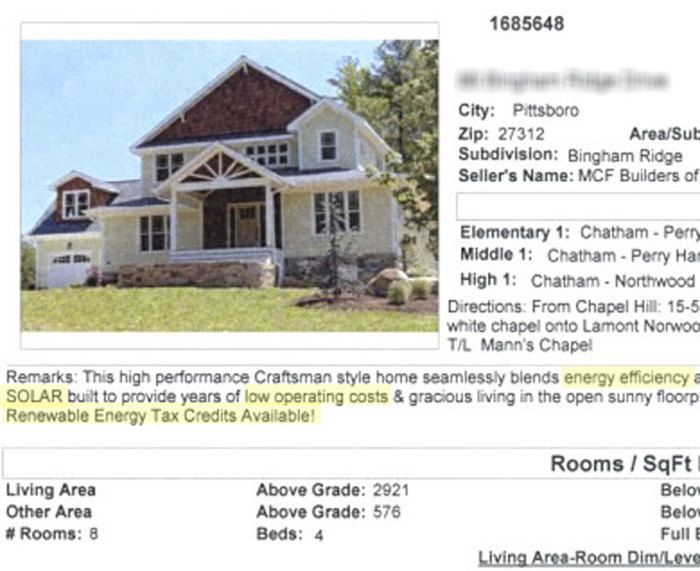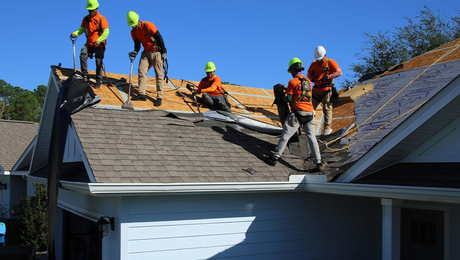
Green houses with extra insulation, active solar systems, and other features that enhance energy efficiency often cost more to build than conventional houses.
It’s a question of long term gain for a little bit more money up front. But builders and homeowners often hit a snag when it comes to construction loans and mortgages to cover the added costs. That’s the subject of this week’s Q&A Spotlight.
Appraisers who set values for bank loans may not know enough to give due credit for energy efficiency and green features. Even if they do, banks making the loans may not allow the practice.
Although local banks may prove more flexible, there’s no guarantee you’ll get the financing you need to build the house you have in mind even if you’ve been pre-approved for the loan.
Read the full article and join the conversation at Green Building Advisor
Fine Homebuilding Recommended Products
Fine Homebuilding receives a commission for items purchased through links on this site, including Amazon Associates and other affiliate advertising programs.

Affordable IR Camera

Handy Heat Gun

8067 All-Weather Flashing Tape

Realtors know that green home features are worth something to buyers, but appraisers and lenders seem to be lagging behind.



















View Comments
Folks, James' "Don't blame the appraiser" and Interested Onlooker's "Reality check" have got the right answer. The bottom line is that the bank wants to know if it can get its money bank under a worst case scenario- a foreclosure auction. At foreclosure, bidders often don't even know the exact square footage of a house or the internal cosmetic condition, much less whether it's "green" or assign any value to it. Appraisers are just conveying this reality- don't kill the messenger.
Unfortunately, green falls in the category of individual homeowner "perks," such as taj majal spa/bathrooms and olympic sized pools in the back yard. If you go green, like with everything else, do it with restraint and you can probably swing the financing. Otherwise, go ahead and splurge on the horrifically expensive sprayed-in foam that has a thousand year half life and will line the landfills for hundreds of years(green?), but don't expect to get costs back upon resale or the bank to finance it.
I wouldn't trust appraisers either as they have their own motivations. I would, however, trust markets as the conveyors of collective intelligence. Like wind power as replacement for coal and high-speed rail as replacement for automobiles, most energy-efficiency improvements are just fantasies of the green religion.
If there were an actual payoff, it wouldn't take much convincing people to adopt more efficient technologies. However, there's a reason why all this stuff requires government subsidies (and still, somehow, never leads to profit): it is a waste.
Drop the green crap and get back to giving good advice on building.
I sure agree with you there, cfraizer. I was in the energy business for over 20 years and, on an issue that is so critically important to our nation's security and economy, I have trouble believing how little people know about energy, especially politicians, and how much purposeful hype and BS there is out there.
Wind power is one of the most highly subsidized sources of power; if people actually saw the true cost of wind energy in their power bills every month, wind would be out of business. Ethanol is a close second for subsidies, although at least folks are now more aware of the unintended consequences that turning food into fuel results in.
And one of the biggest "green" myths is the plug-in electric car. Given that around 60% of the electric power in this country is produced from the dirtiest fossil fuel, coal, what kind of logic makes a plug-in electric car a "zero emmissions" vehicle? What a joke; these greenies can't see past their electric plug or power meter. Electric power just magically "happens" for them.
If this is a discussion about money and values it will go on forever.That's why I quit discussing the subject.Just look at the vehicles sharing the road with you.The pay-off for energy efficiency is directly delivered every time you pull up
to the gas pump.Even this obvious feedback is not very persuasive in changing car buying decisions.The shift in awareness that will make green building understood and supported as more than a niche market will likely not occur until it's too late to avoid a permanent energy crisis.All the debate will not change this.
For one thing, saying "the sprayed in foam" shows that you do not know the differences between the types of foam. There is some really great foam out there, but the politics and the payoffs keep the people ignorant and the prices high. It pays for itself in the long run. Its just that most of the residential stuff built in the last 20 yrs won't last 40 years, and that is the problem with value and risk.
The larger problem is that as far as information goes "crap is king". Most of the supposed experts are anything but. There are celebrities" that endorse things and may or may not know or care about it really. Then there are numerous industry lobbyists who believe "it's just business" and that there is at lease 50% of the problem.
People think that there are two sets of ethics, one for your personal life (and many exclude sex from this - i.e.: "all is fair in love and war") and a much less stringent and even criminal set of ethics for business. Say what ever benefits you, your industry, your buddies, and your client who is paying you to say something or to hold some new product or industry back.
Then we have the human condition where we basically fear change. It was hard for people to accept that tobacco caused lung cancer and that asbestos was not a great household product (insulation) despite huge evidence to the contrary. When lawsuits started then people overreacted with Urethra formaldehyde (appraisers) and devalued homes that had it even though it out gassed in 6 months down to a level no different than anything else in your house that was made with glue. The new smell of a car or carpet that many people love is out gassing of somewhat harmful chemicals (bet they didn't know that!).
Sometimes it is time for the government to come in like a daddy or a teacher at school and make someone do the right thing. The only problem there isn't that most issue like the ones we are talking about don't have some good solutions, but that "crap is king" and the lobbyists will stop the politicians from making the banks value energy efficiency and quality building practices they way they should.
The real problem can be solved by:
1) paying politicians as much money as the heads of companies and professional athletes make.
2) making it impossible for their spouses or siblings to benefit by their actions in politics, and if they don't like it don't run.
3) make the radio and TV stations who license our public air waves to the tune of billions in profit provide a specific amount of free time to candidates that have acquired the necessary number of signatures to run for a particular office (and make the bar high enough to keep the number low enough for the plan to work).
4) and then make the government hire actual independent research firms and make the government BY LAW have to follow up with action or inaction which follows the results of bipartisan research results.
Undoubtedly no one really owns any of the land or the property on it in the long run, we are all just caretakers. People of my generation were left a pretty good deal. I hope we can turn it around and do the same for our decedents, but not all ideas that were good in the short run are good in the long run and different times call for different plans.
It is time for builders to build more sustainably and it is time for appraisers to recognize the better building practices and banks to lend and have rates accordingly. The government may need to step in and make them do it.
After all, we bailed them out like we were their daddies' so maybe they need now to do what their daddies' tell them to do. They seem to chase profit without thought like water going downhill no matter what laws they have to bend or break or no matter what the consequences are in just a few years, get the profit and the bonus now! How can we let children like that play with the gun of the economy (again)?
I think fair energy appraisals are soon on the horizon. The banks care when making more money is involved. Realtors are already including energy efficient upgrades in their listings. It's the insurance companies that I can't see accepting energy appraisals as paying out the replacement cost of energy upgrades isn't in their best interest.
But this article is laid out and sounds more like a useless whine over an issue that none of us are going to change and isn't going to change out of any corporation's good conscience. It just is and we gotta deal with it for the time being.
As for UNCOMMONSENSE's comment... you gotta deal with it too. It is what it is and it ain't gonna change for you or me. But I understand we all have hopes and dreams:
Here are some ideas that would really shake up the building industry:
what if buildings were required to make a considerable amount of their own power?
what if new buildings came with a warranty for at least the length of the loan?
what if a house cost 30 times more than they do now?
what if home building was a required degreed profession?
what if I could demand the wages that I felt I actually deserved working one of the most dangerous, damaging, disrespected, competitive, unstable, and uncertain jobs this country has to offer?